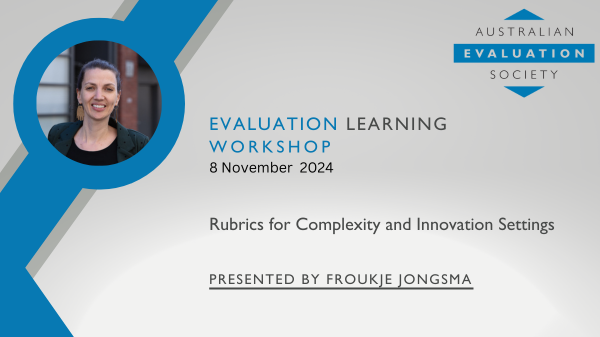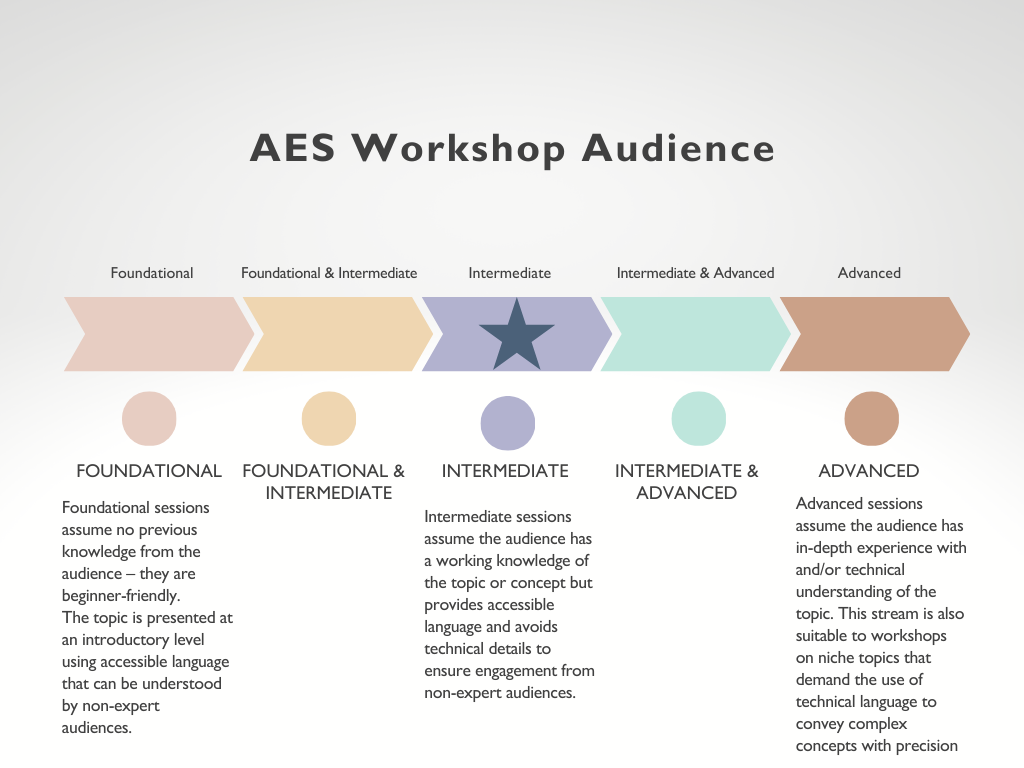Workshop: Rubrics for Complexity and Innovation Settings (Online 8 November 2024)

Workshop: Rubrics for Complexity and Innovation Settings
Date and time: Friday 8 November 2024, 10.00 am to 1.00pm AEDT (registration from 9.45am). Half day workshop - 1 session
Venue: Via Zoom. Details will be emailed to registrants just prior to the workshop start time
Facilitator: Froukje Jongsma
Register online by: Thursday 7 November 2024, unless sold out prior. Spaces limited to 25 participants
Fees (GST inclusive): Members $215.00, AES Organisational member staff $345.00, Non-members $385.00, Student member $125.00, Student non-member $180.00* (GST inclusive) * Students must send proof of their full-time student status to
Workshop Overview
When evaluating social impact, systems change, and place-based approaches evaluators need a toolkit that caters for complexity. Rubrics offer a flexible and effective tool for evidence-informed design and decision-making, shared learning and evaluation, and mapping progress of collaborative-led change across long timeframes. The purpose of this workshop is to build participant capability in developing and applying rubrics for complexity, innovation, and community settings, to support participatory approaches to measurement, evaluation, and learning.
Workshop Content
The knowledge and techniques presented will draw on the facilitator’s extensive practice-based experience of designing and using bespoke rubrics for evaluating systems change and place-based approaches. As well as showcasing a range of examples, participants will learn some key principles, steps, and tips for designing and applying rubrics in complex and collaborative settings. This includes the use of participatory, community-informed, and culturally appropriate processes for rubric development and use, and how to utilise qualitative and quantitative data, evidence, and measures. The workshop will be interactive and include opportunities for peer-to-peer sharing.
Some of the rubrics covered in the workshop include:
-
Progress mapping tools for long-term change initiatives and systems change. These are great for tracking the sometimes ‘invisible’ outcomes, such as shifts in power sharing, community narratives etc, and for allowing for a '360 degree' view across stakeholders and the roles they play to be written into the rubric.
-
Bespoke rubrics for design, innovation and pilots that support rapid learning and developmental evaluation.
-
The First Nations’ Ripple Mapping Tool, a rubric developed by Skye Trudgett (Kowa) and Clear Horizon with 'Firsts Nations First' leadership at the centre.
-
Rubrics to support contribution analysis and strength of evidence rating.
Workshop Outcomes
By the end of the workshop, participants will understand some of the rubrics relevant to complexity contexts and some key principles and steps for participatory rubric development and use. Participants will develop some basic applied skills in participatory design for building a rubric. Throughout the workshop, you will have the opportunity to set out a proposed approach to bring back to and test in your context and/or workplace.
PL competencies
The two key domains of relevance to the Framework are:
-
Domain 3: Culture, Stakeholders and Context - The workshop builds on competency in rubrics as a tool to address diverse definitions of 'what counts as evidence' (characteristic of collaborations and place-based approaches) and is inclusive of a multiplicity of perspectives, including the incorporation of community voice alongside quantitative targets. Rubrics are a very culturally appropriate method for engagement, evaluation processes, and progress reporting - and can cater to a wide diversity of stakeholders and contexts. In the workshop I will promote bespoke context-specific rubric design.
-
Domain 4: Research Methods and Systematic Inquiry - Participants will build skills and understanding in the methods and principles for developing a rubric to suit complexity settings. The case examples I will provide are highly rigorous and systematic approaches for evaluating systems change and place-based approaches. Rubrics are such a versatile and effective tool for helping collaborations make evaluative judgements. However, they do need to be structured to be fit for their purpose and the objective of the evaluative activity. The workshop will cover appropriate evaluative criteria and measures, and how to develop rubrics inclusive of qualitative and quantitative data, as well as participatory processes for how rubrics are used to increase rigour.
Who should attend?
The workshop is designed for evaluators and change-makers working on, or supporting, complex social impact initiatives. It is intermediate level.

-
VIC, NSW, ACT, TAS: 10.00am
-
QLD: 9.00am
-
SA: 9.30am
-
NT: 8.30am
-
WA: 7.00am
-
New Zealand: 12.00pm
For other time zones please go to https://www.timeanddate.com/worldclock/converter.html
About the facilitator
Froukje works as a Principal Consultant at Clear Horizon and brings over 20 years of experience in social impact work. From 2016 onwards her focus has been on leading place-based systems change and building the capacity of cross-sector stakeholders including citizens to collaboratively tackle complex social issues in their communities. Froukje is highly skilled at facilitating complex social impact projects, programs, and processes from beginning to end which includes the design and delivery of Measurement, Evaluation, and Learning (MEL) approaches.
Froukje has worked in government, not for profit, and community contexts in Australia and overseas and is particularly passionate about making MEL accessible, relevant, and empowering. She does this by co-creating approaches that meet the needs of the organisations, collaborations, and communities she works with. Key highlights of her career have been co-leading the Connected Beginnings Collective Impact work in Galiwin’ku, Northeast Arnhem Land together with Yolŋu leaders. Plus, co-facilitating the co-design process of Hands Up Mallee’s joint MEL Framework, winner of the 2022 SIMNA Award for Outstanding Collaboration in Social Impact Measurement.
Event Information
| Event Date | 08 Nov 2024 10:00am |
| Event End Date | 08 Nov 2024 1:00pm |
| Cut Off Date | 07 Nov 2024 4:00pm |
| Location | Zoom |
| Categories | Online Workshops |
We acknowledge the Australian Aboriginal and Torres Strait Islander peoples of this nation. We acknowledge the Traditional Custodians of the lands in which we conduct our business. We pay our respects to ancestors and Elders, past and present. We are committed to honouring Australian Aboriginal and Torres Strait Islander peoples’ unique cultural and spiritual relationships to the land, waters and seas and their rich contribution to society.
